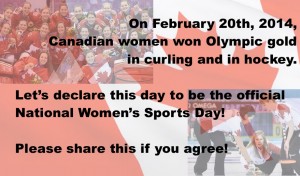This afternoon, I wrote the following letter to six of my Members of Parliament:
—–
Good day,
My name is Dr. Brendan Myers. I am a professor of Philosophy at CEGEP Heritage College, in Gatineau, Quebec. I am also the author of 14 books, mostly in nonfiction.
Yesterday, Canada celebrated as our national women’s hockey team, and our national women’s curling team, won gold medals at the Winter Olympics in Sochi, Russia. Our hockey team has now won Olympic gold four times in a row. And at the time I write this letter, more of Canada’s gold medals at the Games in Sochi have been won by women, or women’s teams, than have been won by men.
I believe that the occasion should be marked by declaring that the 20th of February, the day of our Olympic victories in women’s hockey and curling, should be officially declared National Women’s Sports Day.
Here are some reasons why I think this declaration should be made.
Men’s sports already receive an overwhelmingly large share of money, resources, media attention, and prestige in Canadian society. Events like the Stanley Cup Playoffs, and the Grey Cup Game, are effectively unofficial “Men’s Sports Days”. The same can be said of high profile sporting events in other nations which Canadians enjoy watching: the MLB World Series, the Super Bowl, the Premiership and Champion’s League, the FIFA World Cup. At these events, there are no women on the field, except sometimes as cheerleaders. These occasions are, admittedly, not statutory government-declared holidays. But they are celebrations of men’s athletics nonetheless. There is no equivalent celebration for women’s athletics; not with the same level of prestige, media attention, and economic expenditure. My proposal is a small attempt to help redress this strong inequality.
Another argument might go like this. A National Women’s Sports Day might be a good way to promote Canadian athletes like Hayley Wickenheiser as positive role models for girls and young women. Some of the best known role models for girls and young women are fashion models with unhealthy physiques, and pop stars with dysfunctional lifestyles. A National Women’s Sports Day might be a good way to draw more public attention to better role models: our nation’s highest-performing athletes. The day can also be integrated into existing efforts to promote public health, such as ParticipAction.
No intelligent person would deny the importance of promoting women’s sports. But some intelligent people might deny the need for a government-declared special day for women’s sports. A critic might claim that it’s unfair because there is no equivalent National Men’s Sports Day (although there are several unofficial days, as noted above). Or, a critic might claim that a National Women’s Sports Day is patronizing to women. These arguments, however, could be used against Gay Pride Day, or Black History Month, or National Aboriginal Day, or any other government-endorsed occasion which both celebrates, and also draws attention to the injustice of ignoring, the accomplishments of people in traditionally marginalized groups. (Remember, “Women” are one of the four groups which are recognized in government hiring practices for employment equity and statistical purposes, and this does not discriminate against qualified men.) Finally, a critic might claim that support for women’s sports should grow more naturally and organically, as a movement in culture which the government should neither encourage nor obstruct. In reply, we might look again at comparable events for other traditionally marginalized groups, which governments at various levels (municipal, provincial, federal) do support in various ways, even if only with lip service. Rainbow flags on public buildings are examples of this. We can also reply: a group of people in a democracy, demanding that the government should do or not do something, is exactly what a natural and organic change in a culture looks like.
Finally, let it be added that the declaration of a National Women’s Sports Day would cost the government very little, perhaps almost nothing, in terms of money, staff time, or other resources. Once it is established and publicised, then the Canadian people can do with it what they will. I have confidence they will use it to do great things.
I hope this letter finds you in good health and good cheer, and I look forward to your response.
Sincerely,
Brendan Myers
CC:
Nycole Turmel, MP for Hull-Aylmer (my current residence)
Michael Chong, MP for Wellington-Halton Hills (my hometown)
Stephen Harper, MP for Calgary West, Leader of the CPC, and Prime Minister of Canada
Thomas Mulcair, MP for Outremont, Leader of the NDP, and Official Opposition Leader
Justin Trudeau, MP for Papineau, Leader of the LPC
Elizabeth May, MP for Saanich-Gulf Islands, Leader of the Green Party.
——
Please feel free to copy the text of this email and send it to your own MP. Let’s make this happen!
Also, please click here to “like” National Women’s Sports Day on Facebook.

